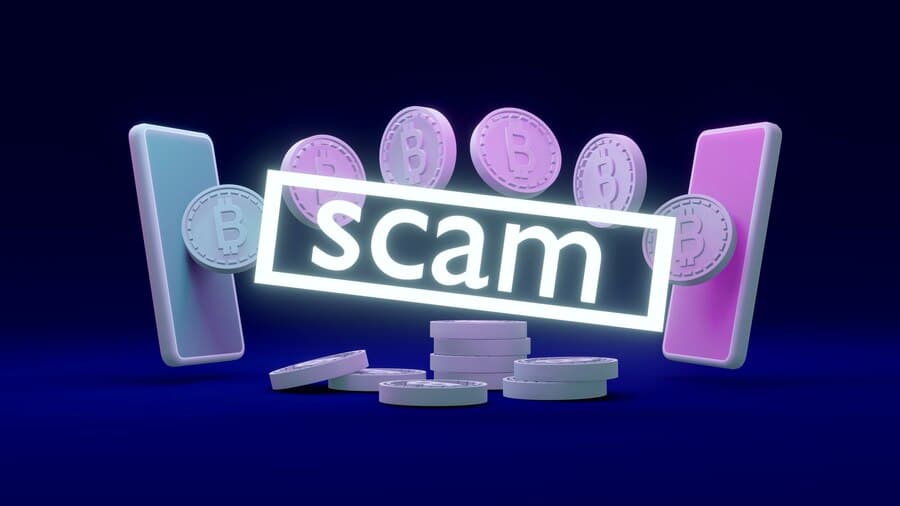Today, the total value of all cryptocurrencies is well over $ 1 trillion. And considering that El Salvador just recently made Bitcoin a legal tender, it’s only logical that you’d want to invest (more) in these digital currencies.
But like with any financial investment, you need to be aware of the risks involved. Specifically, cryptocurrency scams, which are surprisingly still costing people good money to date.
To put this into better perspective, nearly 7000 people reported combined losses of more than $80 million (to cryptocurrency scams) between October 2020 and June 2021. That’s a hell of a lot of money. FTC data further reports that cryptocurrency scams in 2021 are 12 times higher than in 2020. Recently, Metallica went public warning people about a crypto scam that cost one man $25,000 in Bitcoin who was fooled by a fake Metallica-themed YouTube channel.
So, how do the scammers do it? And what can you do to avoid becoming another such statistic in the next FTC report on cryptocurrency scams? Well, here are cryptocurrency scams that you should avoid in 2023.
Investment or business opportunity scams
Investment scams are some of the most common crypto scams on the internet. They typically involve the promise of earning lots of money within a short time.
For instance, scammers pose as investment managers and present you with an unsolicited offer to become a cryptocurrency investor. They lure you to a fraudulent website, where they’ll encourage you to invest the crypto you have. They’ll even create a fake investment account that supposedly stores the numerous benefits of your investment.
But once the victim sends them their hard-earned crypto and logs into the investment account, they soon realize that they can’t withdraw anything. Some scams will even ask victims to pay more fees in crypto to withdraw the money, but it’s all a lie.
Fortunately, it’s quite easy to recognize investment cryptocurrency scams. They all read from the same playbook and will typically;
- Guarantee that you’ll make more money in a surprisingly short amount of time.
- Some will even go overboard and promise you free money, either in cash or cryptocurrency.
So, if you feel that the offer is too good to be true, you’re right; it is.
Employment opportunity crypto scams
Employment cryptocurrency scams are more or less similar to investment scams. The cybercriminal will message you, via email or text, with an unsolicited job offer.
They typically lure you to a fake website to learn more about a high-paying job. Here, the scammers present a training program that requires you to pay for it in cryptocurrency. The cost of training is significant but typically minute compared to the salary you’ll be supposedly getting. But once you pay, the money is as good as gone.
How do you tell an employment opportunity is a scam? Well;
- It’s an unsolicited job offer.
- The job is typically related to cryptocurrency, like helping recruit other cryptocurrency investors, mining cryptocurrency, selling crypto, or joining a team that converts cash to bitcoin.
- You’re required to complete a payment in cryptocurrency before you can begin the job.
Imposter cryptocurrency scams

Imposter or impersonation scams involve cybercriminals posing as trusted figures, e.g., celebrities, government authority, bank representatives, or even credit card providers. They often reach out to their victims via email and make a request that involves you sending them cryptocurrency.
Pretending to be someone/something you’re not may sound a little too ridiculous, but it works surprisingly well despite being the oldest trick in the book. Here is an interesting fact; over the years, crypto scam victims have sent a combined $2 million to fake Elon Musks on the internet.
When not impersonating our resident meme lord billionaire, scammers have also set up imposter websites. These websites typically resemble original companies (e.g., a bank or credit card provider). They will request the victim to pay a certain amount in crypto to fix their account, reverse an accidental transaction, or something along those lines.
How do you know you’re on an imposter website?
- There is no ‘HTTPS’ in the site address.
- There is no small lock near the URL bar. This small lock icon indicates that the site is secure.
- The brand name is usually intentionally misspelled on the fake URL. For instance, scammers will replace the ‘o’ in Coinme with ‘0’ to make C0inme, which looks close enough to the original to fool unsuspecting victims.
- If it’s an imposter celebrity, they will typically request an urgent payment or bring up an enticing exclusive offer to fans.
Social media cryptocurrency scams
Social media crypto scams take place on social media platforms. And given the influence of social media in today’s world, it’s not surprising that many people fall for such scams. Frequently, these scams start as social media posts requesting crypto payments in exchange for bigger benefits. It may even be an advertisement with hundreds of responses and reviews.
These replies and reviews are usually left by bots and other users involved in the scam. And in typical human fashion, when the replies indicate what the post offers is genuine, you’re likely to fall for it. To make it even more believable, they may even employ your other favorite influencer to promote the tag.
Other social media scams involve;
- Influencers touting a new cryptocurrency that’s probably fake. They ask their users to send them payments and sign up for the ‘next big thing,’ but a few months later, the new crypto never launches, and the influencers pocket the money.
- A post from a fake celebrity (similar to impersonation scams) stating that if their followers send them crypto worth a certain amount, they’ll send it back doubled. These are the infamous giveaway cryptocurrency scams that have been popularized by social media.
So, how do you tell a social media scam?
- The responses and reviews to the post sound a little too enthusiastic.
- The post is asking you to send cryptocurrency to the account owner.
- And just like every scam in the book, the advertisement offers quick money within a short time.
Fake apps
Different crypto companies have developed mobile apps as digital payment methods. The apps are usually available for download on Google’s Play Store on Android and Apple’s App Store on iOS. However, scammers and hackers have taken advantage of this and developed replica apps.

According to Bitcoin News, ten of thousands of people have downloaded these fake apps and are probably sending payments to scammers. In addition, there are fake cryptocurrency mining apps in circulation, and the news outlet estimates that around 93,000 users have been scammed into buying such apps.
Fortunately, fake apps usually have some red flags. Watch out for;
- Suspicious and inauthentic branding; the logo is usually incorrect or coloring a little too strange.
- Obvious misspellings in the name of the app or the description.
If you notice any of these red flags, it’s best if you don’t download the app.
Blackmail cryptocurrency scams
Blackmail or extortion relies on intimidation to scam victims. Usually, you will receive an email from someone claiming to have sensitive information about you. This information may be compromising videos and photos or confidential data. Then, the scammers will request you to pay them money in cryptocurrency if you don’t want the information released.
If you receive a threatening message asking for payment in cryptocurrency, it is best to report the sender to the authorities.
Loader or load-up cryptocurrency scams
Loaders are the boldest of scams. The cybercriminal will straight up ask you for your account login credentials. Often, they’ll spend days trying to earn your trust on social media. After some back and forth conversations, the scammer says they need your account to complete an investment because there is an issue with their account.
For instance, their account is locked or needs higher limits that can only be met using your account. In return, the scammer promises to return your crypto plus a generous portion of the proceeds of their investment. Once they get your logins, the cybercriminal loads up your account and then drains it completely.
How does one recognize a load-up crypto scam? Well;
- The other party requests your account logins.
- They promise a good reward.
Who are the prime targets of cryptocurrency scams?
People aged 20 to 49 have been the most eager to adopt cryptocurrency. Unfortunately, this has made them more susceptible to crypto scams than other age groups.
Cryptocurrency security tips
If you want to invest in crypto with confidence, here are some useful security tips;
- Scammers tend to ask to be paid in cryptocurrency because such transactions cannot be reversed.
- Nothing has to be paid in Bitcoin, Tether, Ethereum, Dogecoin, or Polkadot (unless you’re buying things from the dark web). So, if someone insists on being paid in cryptocurrency, that’s a warning that they want to scam you.
- Be wary of opportunities that promise to get you rich quickly through cryptocurrency.
- Resist urgent payment requests from ‘celebrity accounts. If a famous person is in trouble, their famous friends will help them.
Don’t Become the Next Victim
Finally, report any suspicious accounts and activities immediately to the Federal Trade Commission, Securities and Exchange Commission, Commodity Futures Trading Commission, or your cryptocurrency exchange platform.
Frequently Asked Questions (FAQs) on Cryptocurrency Scams
How can I protect myself from crypto scams?
Always verify sources, avoid unsolicited offers, use secure wallets, stay educated, and report suspicious activity to authorities.
What should I do if I fall victim to a scam?
Cease all communication with the scammer, secure your accounts, report the incident, and seek legal advice for recovery.
Are there recent examples of crypto scams?
Recent scams include the WazirX hack, the Bybit hack, and pig butchering scams targeting victims in New York.
How are scammers using AI in crypto scams?
Scammers use AI to create realistic deepfake videos and impersonate individuals, making scams more convincing and harder to detect.






